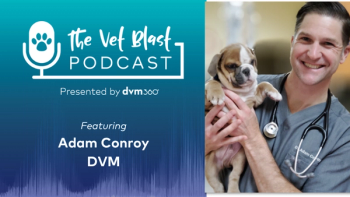
Overcoming an unfufilled promise
When his workplace turned toxic and his partnership opportunity dried up, this doctor learned the hard way that it's better to cut your losses and move on&mdashbefore it's too late.
I THOUGHT SELLING MY SOLO, MIXED PRACTICE AND joining a group practice would help my family life and stimulate my professional growth. So I sold my clinic and moved my family to work in a six-doctor practice. The three partners—one specializing in small animal and two in large animal—seemed excited for my arrival, and all three discussed an eventual partnership. One partner went as far as telling me not to come unless I wanted to be an owner, while another said they wanted to build a new small animal clinic but were waiting for a younger partner with that specialty. The third partner, the 65-year-old founder of the clinic, was a gem—very progressive and open to new ideas. It seemed like a perfect match.
But the move and my previous 14 years of solo practice proved to be too stressful, and within a year my wife asked for a divorce. After 18 months of legal battles, I was granted joint custody of my children. As they live with me every other week, the clinic worked my on-call emergency schedule to allow the quality and quantity of family time I needed. After all that heartache, things finally seemed to come together.
That all changed when the senior partner, the small animal doctor, died suddenly. With this sad event, the practice's attitude and approach to management changed slowly but dramatically.
My role in directing the small animal clinic changed to the point that the nonveterinarian office manager, who had no people skills or empathy, was making most decisions. The family-friendly atmosphere changed to one of fear and apprehension for most of the staff and myself. Team members would follow the owners' directions only to get reprimanded by the office manager for completing the task. The management team would ask for input, then ignore, disregard, or dismiss suggestions. My relationship with the office manager devolved into avoidance on both our parts—and the owners ignored the tension or were gone on farm calls.
I'd hoped to become a partner, but I grew to hate going to work. I loved the pets, clients, and most of the staff, but management issues made it a miserable place for many of us to be.
The partnership discussions, which had been of great importance when I sold my practice and moved, were now nonexistent. I still believed things would improve, but I was only fooling myself. Then construction began on the new small animal clinic. Recalling the promising statements about becoming a partner, I waited for an offer.
While I thought I had a good relationship with the two partners, I soon realized my relationship with the office manager had destroyed any chance at ownership. And while I respected the owners' right not to offer me a partnership if I didn't fit their needs, I wished I'd been told.
I spent long days and sleepless nights coming to grips with six years of work and dedication building a client base that I now knew I'd have to give up. I loved my profession but hated where I was practicing. So I made the decision to open my own practice in a town 45 miles away. I'd started a practice from scratch before and was sure I could do it again.
I'd just remarried and had the support of my wife and children. So I gave my contract-stipulated 90 days notice and continued to work in the hostile environment I'd become accustomed to.
It was a typical Monday morning, five weeks into my final 90 days. I made the coffee, did surgery as usual, and called clients afterward. I felt unusually cold that day, and, in the middle of a phone call, I passed out. For a few moments I could hear people around me, but I couldn't move or respond. The next thing I remember was my wife asking me to wake up. After four hours spent unconscious in the ER, I awoke and a doctor told me I'd overdosed on barbiturates.
I spent the next few weeks in a daze, physically and emotionally. The police investigation found pentobarbital in my blood and in my coffee. Endless questions bombarded me. How could something used in the clinic for euthanasia end up in my coffee? Did someone hate me so much that they'd do me harm? Was I a bad person? Feelings of anger, frustration, fear, doubt, disappointment, and disbelief consumed me.
The local police never discovered how the euthanasia solution got in my coffee, and I never returned to work. I needed the income to support my family, but I wasn't allowed to return to the practice—which is probably a good thing. My former employers denied my workers' compensation claim, and I ended up paying all my medical bills. My contract wasn't paid out, and the commissions I'd earned while practicing there never materialized.
The bottom line
I was told to take these complaints to court. But my family and I decided it wasn't worth reliving a nightmare for a few thousand dollars. I'd seen fear on the faces of my wife and children—and once was enough.
We've moved on, and I'm very happy with my new hospital. The only licensed technician from my former clinic came with me, and now we both enjoy our careers again.
What did I learn from this nightmare? First, I discovered that not every potential partnership will work—and that's OK. To avoid such a problem, all involved parties need to be honest with each other and put a date on the decision. I feel you should know within 18 to 24 months whether everyone can work together.
Second, don't wait out a bad situation; it'll probably only get worse. Life is too short! Find a place where you can practice the way your heart tells you to practice.
Third, 90 days is too long to remain once you resign. Thirty days is more appropriate. Even in a good situation, the environment can turn hostile. Trust me, a hostile situation almost cost me everything. I chose to leave the practice, but I didn't choose to do it in an ambulance.
Finally, the most important lesson I learned was to forgive. I used to lie awake at night, aggravated and angry, thinking about what had happened, didn't happen, or should have happened. The people I was angry with were likely sleeping peacefully, without any idea that I was awake and miserable. So whose life was consumed and wasted?
I finally learned to relinquish my deep-seated bitterness, resentment, and consuming rage. This doesn't excuse what happened or erase history, but forgiveness doesn't need to be asked for or deserved. Some people recommend you "manage" your anger, burying it deep inside. For me, it was better to release the anger, resolve it, and forgive. Forgiveness is a gift that means far more to the giver than it does to the receiver.
Life is a great adventure. Coach Lou Holtz said, "Life is 10 percent what happens to me and 90 percent how I react to it." I've chosen to react to things in a way that's better for me and for my family. I'm choosing to be happy and to count my blessings. I'm also trying to imitate my golden retriever Cruiser—by shedding a lot. Everyone should try getting rid of what they don't need, what weighs them down. Now I'm truly alive to enjoy the family, friends, clients, and pets who love me!
Dr. R. Craig Brakeman now lives and happily practices veterinary medicine at Banfield, The Pet Hospital in Traverse City, Mich.
Newsletter
From exam room tips to practice management insights, get trusted veterinary news delivered straight to your inbox—subscribe to dvm360.






